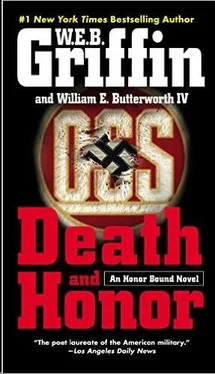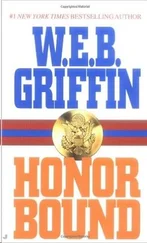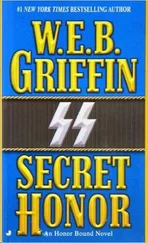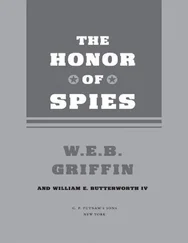Griffin W.E.B. - Honor Bound 04 - Death and Honor
Здесь есть возможность читать онлайн «Griffin W.E.B. - Honor Bound 04 - Death and Honor» весь текст электронной книги совершенно бесплатно (целиком полную версию без сокращений). В некоторых случаях можно слушать аудио, скачать через торрент в формате fb2 и присутствует краткое содержание. Год выпуска: 2009, Издательство: Penguin USA, Inc., Жанр: Старинная литература, на английском языке. Описание произведения, (предисловие) а так же отзывы посетителей доступны на портале библиотеки ЛибКат.
- Название:Honor Bound 04 - Death and Honor
- Автор:
- Издательство:Penguin USA, Inc.
- Жанр:
- Год:2009
- ISBN:нет данных
- Рейтинг книги:4 / 5. Голосов: 1
-
Избранное:Добавить в избранное
- Отзывы:
-
Ваша оценка:
- 80
- 1
- 2
- 3
- 4
- 5
Honor Bound 04 - Death and Honor: краткое содержание, описание и аннотация
Предлагаем к чтению аннотацию, описание, краткое содержание или предисловие (зависит от того, что написал сам автор книги «Honor Bound 04 - Death and Honor»). Если вы не нашли необходимую информацию о книге — напишите в комментариях, мы постараемся отыскать её.
Honor Bound 04 - Death and Honor — читать онлайн бесплатно полную книгу (весь текст) целиком
Ниже представлен текст книги, разбитый по страницам. Система сохранения места последней прочитанной страницы, позволяет с удобством читать онлайн бесплатно книгу «Honor Bound 04 - Death and Honor», без необходимости каждый раз заново искать на чём Вы остановились. Поставьте закладку, и сможете в любой момент перейти на страницу, на которой закончили чтение.
Интервал:
Закладка:
Frade was annoyed: If a Marine saluted a full bull colonel that sloppily, he’d find himself suddenly practicing the rendering of the hand salute for the next two weekends.
“We’re expected,” Graham said as he returned the salute.
“Yes, sir,” the guard said, and walked to a counterbalanced striped barrier pole and raised it. Then he gestured somewhat impatiently for the staff car to pass.
Five hundred yards from the gate was a copse of trees and beyond that another fence. It was a standard chain-link fence that looked as if it belonged in someone’s backyard and might, Clete thought, pose a problem for a six-year-old to climb over.
Inside the fence line were small groups of German officers, perhaps two dozen men in all, apparently out for a morning stroll.
“The little one with the big nose,” Graham offered, “is General Hans-Jürgen von Arnim, who has the dubious distinction of having surrendered the Afrikakorps.”
Frade found General von Arnim—who wore a khaki uniform and had his hands folded on his back—marching purposefully over the sparse grass, trailed by four other officers.
Graham went on: “He’s not looking at us, of course, but I’m sure he’s wondering what’s going on. By now, he knows we’ve taken Frogger from the general population.”
“He’s not the only one wondering what’s going on,” Clete said. “Are you going to tell me what I’m supposed to do? Or am I supposed to wing it?”
“Actually, Major Frade, I’ve given the question of how you should handle this a good deal of thought. If I knew what you should do, I’d tell you. But I don’t know. I could tell you to wing it, but that’s a little too casual. So I think that you should use your best judgment. I’ll back whatever you decide to do.”
Clete didn’t reply.
“The expected response, Major, was, ‘Aye, aye, sir.’ ”
“Aye, aye, sir.”
There was another copse of trees on the other side of the field, where the Germans were having their morning constitutional, and then the camp itself. It looked like any other hurriedly-built-to-last-five-years temporary military installation, like Jackson Army Air Base.
There were no hangars, of course, but there were many more “colonel’s quarters” than Frade expected to see. These were small, one-story frame buildings intended for the use of senior officers. They held two bedrooms, a living room, a dining room, a kitchen, and a bath.
The staff car pulled up before one of them, and the driver got out to open Graham’s door.
Graham looked at Frade. “Do you want us to come in with you?”
It was a moment before Clete had time to consider the question.
“You go in first,” he finally said. “Then Len goes in—I want this guy to recognize him from the photos—then I’ll come in. Neither one of you say anything to him. If I give you a signal, leave us alone.”
Graham’s face tightened. He had just been given an order, not a suggestion. Marine majors do not give orders to Marine colonels.
He decided this was not the time to raise the subject.
After a moment, he nodded and said, “Okay.”
[TWO]
Inside the larger bedroom of Building T-402, Oberstleutnant Wilhelm Frogger heard the crunch of tires on the pebbles on the driveway. He stood up and went to the window and looked out through the steel mesh.
Frogger was dressed, like General von Arnim, in the tan desert uniform of the Afrikakorps. It was nearly new. The Americans had captured matériel as well as prisoners, shipped it to the United States, and now were issuing it to their prisoners.
The room was furnished with a standard U.S. Army steel cot, a simple wooden table, and a folding metal chair. A door led to a basic bath with a sink, a water closet, and a shower. On the table were an ashtray fashioned from a can of Planters peanuts, a stainless-steel water pitcher, a china mug, and a Masonite tray holding the remnants of the breakfast—scrambled eggs, bacon, toast, milk, and apple jelly—he had been served at half past seven.
There also was a cardboard box; today was Ration Day, and his ration had been delivered with his breakfast.
The cardboard box held a box of kitchen matches; a carton of Wings cigarettes; an unopened can of Planters Peanuts; a tube of Colgate toothpaste; two Hershey chocolate bars; two bars of soap; a pad of lined paper; a Prisoner’s Mail form, which, when filled in, would serve as his weekly letter home; and two pencils.
Frogger had taken nothing from the box but a package of cigarettes. When they had brought him to Camp Clinton, he had been ordered to bring all his personal property, and the U.S. Army duffel bag on the floor held all the things he had needed except cigarettes. The carton-a-week ration always ran out a day or two before Ration Day, no matter how hard he tried to make it last the whole week.
Next to the ration carton was the manila envelope filled to capacity with eight-by-ten-inch photographs of his family that the military police major had given him yesterday.
Frogger saw through the window that the same military police officer was getting out of the front seat of the staff car. And, a moment later, the man who had come to see him early last evening got out of the backseat.
Now he’s in uniform.
But it’s not a U.S. Army uniform.
What do they call their naval infantry—Marines?
Ja . . . the man is wearing the uniform of a colonel of the Corps of Marines.
And then another got out of the car. A civilian with long hair.
He’s the other man in the photographs of my parents.
That confirms it. The military police major is the other man in the photographs.
I have no idea who they are, or what they want from me, but I am going to have to be very careful.
Frogger looked at the table. He had taken several photographs from the envelope to look at them again, and had not returned them. He turned from the window, walked quickly to the table, put the photographs back in the envelope, then arranged it neatly beside the ration box.
He took a pack of Wings cigarettes from his shirt pocket, removed one cigarette and lit it with a kitchen match, then sat down in the metal folding chair to wait for whatever was going to happen next.
Oberstleutnant Wilhelm Frogger stood up and came to attention as military courtesy dictated when Colonel A. F. Graham, USMC, walked into the room followed by the military police major. A moment later, Frade entered the room.
“Guten Morgen, Herr Oberstleutnant,” Frade said.
“Guten Morgen.”
“My name is Frade.”
“Oberstleutnant Frogger, Wilhelm, Identity Number 19-700045.”
Frade gestured with his hand for Graham and Fischer to leave.
“And please close the door,” Frade said.
Graham and Fischer left the room and the door clicked shut.
Frogger picked up on that.
This man is younger than the Corps of Marines Oberst.
But apparently he is in charge.
Frade looked Frogger square in the eye.
“Do you speak English, Colonel? My German is not that good.”
“Lieutenant Colonel Wilhelm Frogger, Identity Number 19-700045.”
“The way you said that, Colonel, suggests you think you are about to be interrogated.”
“I believe that under the Geneva Convention,” Frogger said in vaguely British-accented English, “by which both our nations are bound, giving my name, rank, and identity number is all that can be required of me.”
“I’m not going to question you because you have no information I need. The Afrikakorps no longer exists. You may sit if you like.”
Frogger decided that standing at attention served no useful purpose, sat down, and picked up his cigarette from the Planters peanuts ashtray.
Читать дальшеИнтервал:
Закладка:
Похожие книги на «Honor Bound 04 - Death and Honor»
Представляем Вашему вниманию похожие книги на «Honor Bound 04 - Death and Honor» списком для выбора. Мы отобрали схожую по названию и смыслу литературу в надежде предоставить читателям больше вариантов отыскать новые, интересные, ещё непрочитанные произведения.
Обсуждение, отзывы о книге «Honor Bound 04 - Death and Honor» и просто собственные мнения читателей. Оставьте ваши комментарии, напишите, что Вы думаете о произведении, его смысле или главных героях. Укажите что конкретно понравилось, а что нет, и почему Вы так считаете.












